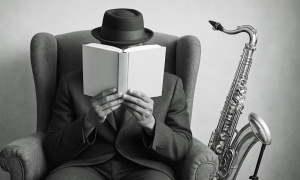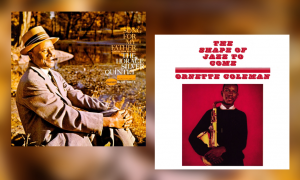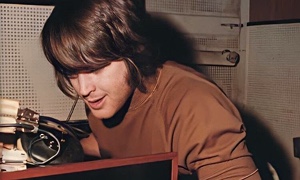Home » Jazz Articles » Building a Jazz Library » Pharoah Sanders: An Alternative Top Ten Albums To Feed Your Head
Pharoah Sanders: An Alternative Top Ten Albums To Feed Your Head

Courtesy Fred Katz
I loved what Alice was doing. Her playing was amazing. But I always felt like I wasn’t good enough—she seemed more intellectual than I was. But I tried to play something close to the concept she was doing. At one point I said, ‘I don’t know if you like the way I’m playing or not, whether this fits.’ She said, ‘You’re doing O.K. Just keep on blowing.’
—Pharoah Sanders
An early foretaste of Sanders' longterm trajectory came with his debut album for Impulse! in 1967. Recorded while he was still a member of Coltrane's barn burning band, Tauhid was Sanders' declaration of independence, its broken notes, sandpaper vocalisations and bottom-end explosions tempered by passages of exquisite delicacy. Tauhid, and in particular its centrepiece, "Upper Egypt & Lower Egypt," still ranks among Sanders' most entrancing work.
Born Farrell Sanders in Little Rock, Arkansas in 1940, Sanders came up through the ranks of local bar-walking tenorists before arriving, after two years in Oakland, California, in New York City in 1961, where he fell in with the young avant-garde which was already clustering around John Coltrane. He recorded his debut album, Pharoah, for ESP in autumn 1964, and began playing with Coltrane around the same time. Beginning with 1965's Ascension, he is heard on around a dozen albums which Coltrane recorded for Impulse! before he passed in 1967. The following year, Sanders began an association with Alice Coltrane which cemented, and to an extent codified, the paradigm he had laid out on Tauhid.
Given the in-your-face tumult of much of his early work, by which he is still largely defined, Sanders is sometimes imagined to be as abrasive in person as he was then (and still can be) as a saxophonist. In fact, he is quietly spoken, approachable and self-deprecating....
In his most recent interview, with The New Yorker in January 2020, Sanders said of his time with Alice Coltrane: "You know, her playing was amazing. I loved what she was doing. But I always felt like what I was doing wasn't good enough. Maybe I was playing a little bit more dominant than what she wanted. She seemed more intellectual than I was. But I tried to play something close to the concept that she was doing. At one point, I had told her, 'I don't know if you like the way I'm playing or not. I don't know whether this fits, or what.' She said, 'You're doing O.K. Just keep on playing. Keep on blowing." He felt similarly inadequate during his time with John Coltrane.
In the same interview, Sanders was asked if he was happy with his playing on any of his albums. "Sometimes on my horn, a couple of notes, I'm feeling satisfied with it," said Sanders. "But the rest of the notes just is not sounding right. So I'm still working on that."
Such is the splendour of Sanders' work on Impulse! between 1965 and 1975, with the Coltranes and under his own name, that a credible Top Ten (even Top Twenty) Albums list could be compiled purely from his work on the label. But Sanders has conjured wider magic than that, much of it in more recent times.
This Alternative Top Ten excludes all Sanders' Impulse! albums, as leader or sideperson, in order to focus on less widely celebrated but equally elevated releases. Hopefully, you will find one or two items that have so far escaped your radar.
 Sun Ra
Sun RaSun Ra And His Arkestra Featuring Pharoah Sanders And Black Harold
El Saturn, 1976
This gloriously eruptive album was recorded live in 1964 at Judson Hall, New York City, during the Jazz Composers Guild's Four Days In December festival. Following the early 1965 break-up of the Guild, which had intended to release it, the album was lost in space, but was eventually released in 1976 on El Saturn. Since then it has reappeared under various titles, with different sleeve designs and track listings, and on various labels. The first reissue was on El Saturn itself later in 1976, retitled Gods On A Safari. Welcome to the world of Ra. Anyway, the original LP was a four track affair with Sanders—who was depping for John Gilmore, then on sabbatical with Art Blakey—featured full-tilt on side one and flautist Black Harold (a.k.a. Harold Murray) on side two. A historic meeting, recorded just three months after Sanders' volcanic debut, Pharoah.
 Pharoah Sanders
Pharoah SandersLive At Antibes Jazz Festival Juan Les Pins July 21 1968
Alternative Fox, 2019
In places rhapsodic, at other times ferocious enough to weld metal, Live At Antibes Jazz Festival Juan-Les-Pins July 21, 1968 catches Sanders between the sonic extremes of his work with John Coltrane and the mellifluous vibe of Tauhid. The main event is "The Creator Has A Master Plan," the first studio version of which was about to appear on Karma (Impulse!, 1969). Leading a quartet, Sanders is accompanied by bassist Sirone and drummer Najeed Shabazz, two card-carrying members of the New York avant-garde, and pianist Lonnie Liston Smith. Smith is best known for his cosmic funk but he more than holds his own. The set kicks off with a volcanic, untitled jam, followed by "The Creator Has A Master Plan," and closes with Tauhid's "Venus." The audience loves it all, a far cry from Coltrane's appearance at the festival three years earlier, when the "A Love Supreme" suite was met by cat-calls and walk-outs. A great album, well recorded by a German radio station.
 Leon Thomas
Leon ThomasSpirits Known And Unknown
Flying Dutchman, 1969
Singer Leon Thomas was the co-composer of "The Creator Has A Master Plan" and was featured on Karma. Shortly after producing that album, Impulse! house producer Bob Thiele left Impulse! to set up Flying Dutchman Records. Spirits Known And Unknown includes some of the Karma musicians, notably Lonnie Liston Smith and flautist and alto saxophonist James Spaulding. Sanders had in the meantime signed an exclusive recording contract with Impulse! and so appears under the pseudonym Little Rock. Most of the horn action is down to Spaulding, whose flute replaces Sanders' tenor on an abbreviated version of "The Creator Has A Master Plan." But Sanders burns on the Malcolm X tribute, "Malcolm's Gone," another original co-composed with Thomas. Some reissues include a bonus track titled "Damn Nam (Ain't Goin' To Vietnam)," recorded live at New York's Fillmore East in 1970. The uncredited tenor player is either Sanders or someone channelling him.
 Pharoah Sanders
Pharoah SandersJourney To The One
Theresa, 1980
The album that introduced Sanders to a new generation of dancefloor-loving jazz neophytes. After he was dropped by Impulse! in 1975, the victim of a cost-cutting change of label ownership, Sanders hopped between India Navigation, Arista and Nova to relatively underwhelming effect. In 1980, however, things looked up again, after he signed with Theresa, where he continued recording until 1987. A double album, Journey To The One featured two musicians who would be heard with Sanders through the mid 1980s, the solid if rather unadventurous pianist John Hicks and the brilliant, funk-friendly drummer Idris Muhammad. It also included a feature of many future Sanders albums, a John Coltrane cover. Here, it is "After the Rain." Another highlight is Sanders' "You've Got To Have Freedom," which, along with "The Creator Has A Master Plan," went on to become a staple of his live set.
 Pharoah Sanders
Pharoah SandersOh Lord, Let Me Do No Wrong
Doctor Jazz, 1987
Bob Thiele set up the Doctor Jazz label in 1983 as a successor to Flying Dutchman, and the presence of Leon Thomas on Oh Lord, Let Me Do No Wrong, together with the album's title, might suggest a reprise of Spirits Known And Unknown. But the music is more multi-faceted than that. Thomas is heard on three tracks: "Oh Lord, Let Me Do No Wrong," which could almost be from the Spirits Known And Unknown sessions, and "If It Wasn't For A Woman" and "Next Time You See Me," which are downhome carnal blues. There is duality, too, in the keyboard players. Lonnie Liston Smith's brother, Donald Smith, serves up cosmic funk on electric keyboards, while John Hicks' longtime successor on acoustic piano, William Henderson, adds his trademark sinewy romanticism. In a third category are Johnny Burke's "Polka Dots And Moonbeams" and Jimmy McHugh's "Clear Out Of This World." The Coltrane cover is "Equinox." A directionless mish mash? Not a bit of it. There is far more that unites the tracks than divides them. Big fun all round.
 Sonny Sharrock
Sonny SharrockAsk The Ages
Axiom, 1991
The guitarist Sonny Sharrock went way back with Sanders. He was one of the musicians who helped create the deliciously fractured beauty of Tauhid. So it is fitting that co-producer and Axiom label founder Bill Laswell reunited the pair on what proved to be Sharrock's final album, recorded with a quartet which is completed by acoustic bassist Charnett Moffett and drummer Elvin Jones. In the twenty-four years since their first meeting, Sharrock and Sanders had perfected their intoxicating blends of abrasion and lyricism and Ask The Ages is perhaps Sharrock's greatest achievement, one to which Sanders makes a major contribution. The material includes Sharrock's Sanders tribute, "Little Rock." In the mid 1980s, Laswell had declared "jazz is dead." He then went on to disprove the assertion with albums such as this. We will encounter Laswell again in this Top Ten, in diverse guises.
 Pharoah Sanders
Pharoah SandersCrescent With Love
Evidence, 1994
Crescent With Love is Sanders' double-album tribute to his mentor, focusing on Coltrane's classic quartet period. Nine of the twelve tunes were either written or had been recorded by Coltrane: "Lonnie's Lament," "Wise One," "Feelin' Good," "Too Young To Go Steady," "Naima," "Crescent," "In A Sentimental Mood," "Body And Soul" and "After The Rain." The treatments are in the main respectful rather than reimagined and the love shines through. The band is completed by bassist Charles Fambrough, drummer Sherman Ferguson and William Henderson, who contributed the elegant "Softly For Shyla." There is a wonderfully Coltrane-like performance of Erroll Garner's "Misty," and Piero Piccioni's "Light At The Edge Of The World" became a live staple for Sanders.
 Maleem Mahmoud Ghania
Maleem Mahmoud GhaniaThe Trance Of Seven Colors
Axiom, 1994
And now for something completely different.... Recorded live in the walled courtyard of a house in Essaouira, Morocco by Bill Laswell, The Trance Of Seven Colors features Sanders alongside the guimbri player Maleem Mahmoud Ghania, a leading light of gnawa, a percussive, black African cult music which originated in southern Morocco. There are none of Laswell's trademark sonic manipulations and only a little editing: the album is a field recording, pure and simple. Sanders is variously heard with Ghania and his percussion ensemble, and alongside ghaita players Abdelmalak Ben Hamou and Maleem Abdelkabir Addabachi. Most of the tunes are traditional gnawa numbers; two others, including "Peace In Essaouira," which is dedicated to Sonny Sharrock, who had passed a week earlier, are Sanders originals. Sanders scrolls back to the declamatory style of his work with John Coltrane.
 Pharoah Sanders
Pharoah SandersMessage From Home
Verve, 1996
On Message From Home, Bill Laswell revisits and tweaks the electrified, pre-digital, avant-funk studio template he had made his name with in the mid 1980s, while Sanders stays mainly with the broken-note strewn, analogue-age rhapsodising that became his default mode in the early 1970s. Against expectations, it works. The burnished, chugging vibe is reminiscent of Kraftwerk's Autobahn (Philips, 1974), fast-forwarded two decades. The lineup is a mixture of Laswell and Sanders regulars: Parliament-Funkadelic keyboardist Bernie Worrell, pianist William Henderson, programmer Jeff Bova, electric and acoustic bassists Charnett Moffett and Steve Neil, and drummer-percussionists Hamid Drake and Aiyb Dieng . Violinist Michael White and kora player Foday Musa Suso add spice. Sanders is in full "Upper Egypt & Lower Egypt" pomp on tenor and soprano saxophones, flutes, bells, bowls and vocals. The team's follow-up, Save Our Children (Verve, 1999), was a little over polished, even a little cheesy at times, as on "A Nightingale Sang In Berkeley Square." But the tune, one of Sanders' personal favourites, is divine and so we can live with a little cheese.
 Pharoah & The Underground
Pharoah & The UndergroundSpiral Mercury
Clean Feed, 2014
This live recording from the Jazz em Agosto festival in Portugal in 2013 features Sanders fronting a mash up of cornetist and electronicist Rob Mazurek's Chicago Underground and Sao Paulo Underground bands. Along with the two horn players, the lineup comprises, Guilherme Granado on keyboards, vibraphone and marimba, Mauricio Takara on electronics, synths and cavaquinho, Matthew Lux on electric bass and guitar and Chad Taylor on drums. The setting, which resembles a fast-forward of the band Miles Davis assembled for Bitches Brew (Columbia, 1970), is a radical one, but midway through his eighth decade, Sanders is still fearless, still smoking hot. And so he was four years later in London, at the historic Tribute to Alice and John Coltrane concert he headlined at the Barbican Centre. As 2020 draws to close, Sanders will likely be itching to get back on stage as badly as musicians a quarter of his age.
Tags
PREVIOUS / NEXT
Support All About Jazz
 All About Jazz has been a pillar of jazz since 1995, championing it as an art form and, more importantly, supporting the musicians who make it. Our enduring commitment has made "AAJ" one of the most culturally important websites of its kind, read by hundreds of thousands of fans, musicians and industry figures every month.
All About Jazz has been a pillar of jazz since 1995, championing it as an art form and, more importantly, supporting the musicians who make it. Our enduring commitment has made "AAJ" one of the most culturally important websites of its kind, read by hundreds of thousands of fans, musicians and industry figures every month.
























